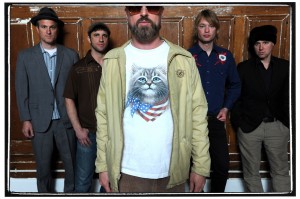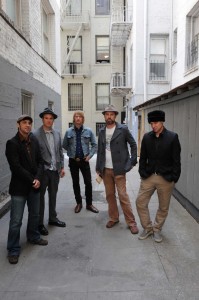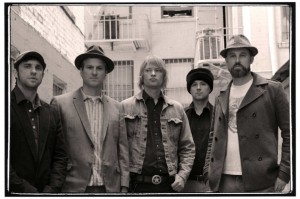 The quirky, sardonic, half-spoken/half-sung vibe of Cake's music extends far beyond their recorded material. You'll find it in their live performances, defined by a unique brand of audience interaction. You'll also find it on the Web, where the band constantly engages its fans with advice, links to news stories, and sometimes heated discussion.
The quirky, sardonic, half-spoken/half-sung vibe of Cake's music extends far beyond their recorded material. You'll find it in their live performances, defined by a unique brand of audience interaction. You'll also find it on the Web, where the band constantly engages its fans with advice, links to news stories, and sometimes heated discussion.
Cake's front man John McCrea, the voice and face of much of this activity, sat down with HeadCount to discuss how he tries to infuse a sense of populism in his communication with fans, and the various reactions that invokes.
On the heels of an iPod commercial featuring the seminal hit "Short Skirt/Long Jacket", and with their most recent album "Showroom of Compassion" debuting at No. 1 on the Billboard charts, Cake and McCrea have found a new audience eager to participate or, at times, complain.
HeadCount: I appreciate you taking the time today. I know it’s a busy year. First off, how familiar are you with HeadCount?
John McCrea: I know what you do, but I don’t know how you started. Tell me your origin story if you don’t mind.
Sure. We started in 2004; just some music fans and musicians getting together and saying “let’s make sure that people are getting out to the polls.” We were kind of inspired by a Hunter S. Thompson quote that said “If every Deadhead in Florida had voted the world would be a different place.” Our basic model is we have volunteers in every major city. We set up tables at the concerts to register voters and bring some information and socially conscious conversation to the shows.
I actually knew most of what you told me, but I’m glad that I asked you because I like that Hunter S. Thompson quote. You know what’s always bothered me? That the people who I think should be the most concerned and aware in our society tend to be the ones who are just sort of tuning out. To tune out like that - it’s sort of like the housewife in the 60’s on valium or something. It’s not a gritty sort of subversive thing – it’s actually a sort of coddled pudgy thing. That’s I guess really why I like that quote. It’s frustrating for me, I guess.
Yeah, we noticed at the time concert-goers seemed to be politically inclined, but also somewhat disaffected. We thought it wouldn’t take that much effort to get this kind of community engaged.
Well, here’s why they’re disaffected. I mean, I’ll tell you - there’s crazy stories about the world being connected in ways that are so complex, you know that obviously it’s implausible. Conspiracy theories that the whole thing is rigged - they really run rampant. And especially the Deadhead type, or hippy sort of people that have checked out, really should be the most engaged and should be the most concerned about political issues because maybe their views run more counter to the mainstream. [But] in order to be engaged in politics you have to be able to see that, okay, even though this politician is bought and paid for, it’s better to have this one than that one because with this one maybe we’ll have more money going to schools. Right? It’s not a clean victory; it’s a nuanced victory, isn’t it?
Yeah, a pragmatic one.
Right. But there’s something about music and music listeners that is sort of an escape from pragmatism. So that’s the challenge, I think, of an organization like yours. It’s creating incentive to be satisfied by a nuanced victory. Not an NFL football victory, but a tiny bureaucratic victory or a negligible victory even. But one that affects, like in the case of schools, a bunch of children. You know we’re not saving the entire world, but maybe like 100,000 kids will be better educated. And trying to find some sort of emotional satisfaction in that, you know, even though there’s a litany of negative concerns around those politicians. That’s a tall order for people that are busy indulging in the emotional duplicity of music.
 Now what about Cake fans? Do Cake fans kind of fit into what you’re describing, or do you think it’s a different sort of community?
Now what about Cake fans? Do Cake fans kind of fit into what you’re describing, or do you think it’s a different sort of community?
I think it’s all over the map. There are Cake fans that threaten us that if we post one more non-music related story on our website or Facebook site they will never buy our music again - they will only steal our music. There’s a whole bunch of people that are threatening that if we bring up any subject that’s not about music, that its over, we’re not gonna be able to put food on our table anymore. And then there are people who think we don’t go far enough in terms of taking a stance. It’s good that we have a lot of different ideas. But it’s scary for us when people threaten to take away our livelihood… not that it’s enough people to actually close us down. But it’s interesting hearing passionate hostile voices right now.
I’m really intrigued by what you guys are doing on the web. It seems to be taking the audience participation - that’s so integral to your live show - and bringing it to the web. Is that a fair description?
Yeah, I think so. I’ve always sort of been - at least when it comes to communication - about populism. And there is something really exciting when a lot of people are all doing something together. If you look at our website or Facebook page, whether you agree with them or not, they’re really engaging.
What items have gotten the most reaction?
Well, anything that we post about politics directly gets people very angry. The Democrats changed a lot of things, like using CFL bulbs [at the Capitol building], and tried to make their whole existence a little bit more environmentally friendly. And the Republicans are bringing back the Styrofoam cup and don’t want recycled stuff. And we posted that article and a lot of Republicans got really furious with that while a lot of people said “thank you for posting that, it was interesting.” But for most people, I guess it didn’t really look good to be bringing back the Styrofoam cup. I guess it’s incendiary and it’s sort of partisan, but it was also factual so we felt like it was okay.
The other thing people get angry about, that I don’t think should be a partisan issue, is when we’ll post something about an environmental issue. For me that’s the key issue. It’s more important to me than any of the other issues because you don’t get to have any of the other issues if you don’t have a working environment and ecosystems. To me, we can argue about gay marriage a lot, but we don’t even get to do that unless we have clean air and water. But for some reason people get really angry and call us hippies I guess for bringing up those kinds of issues. I just don’t know when they became marginalized into political issues at all. I don’t think whether people have clean air or clean water – I don’t see how that’s a political issue.
One thing you put up on your news page was about 97 percent of climate scientists saying that global warming was real. I’ve since found that it comes up in conversations; it was just a factoid that once I knew it, it kept coming up. Is that what you are trying to accomplish - to inform debate - or is this more just about creating conversation in your community?
I would like stuff like that to leak out off the website, into the office, the water cooler dialogue. People can repost that story and that would be great if that happened a lot. And I think it does to a certain degree, I’m not sure how much. But yeah, you want to get information out, especially information that can possibly help us - especially information that maybe dislodges fake information.
The thing that maybe embodies everything we’re talking about is the tree giveaway and the tree gallery. Can you tell me a little bit about that and how all that got started?
The story is a while ago when I was a struggling musician in Sacramento, California I bought a tree for about seven dollars at a sale – a garage sale or something – and planted it in the median between my apartment building and the street. And I took care of it for a while, but then my life went on, and the band started touring a lot. Years and years went by, and because the band was getting more and more successful, I wasn’t home at all and I moved away. About ten years or so later I just happened to be walking in that part of town for some reason and walked by the tree that I planted when it was about three feet tall… and it was about twenty-five or thirty feet tall. It just blew my mind, and it just dwarfed my sense of time. And I guess it occurred to me that everyone should have some sort of experience that does that. And although there is no way we’re going to save the world by giving away a few trees, it's just something that I think, maybe if a few more people can have that experience, it probably is a good thing. The reason why it’s a good thing is hard to pin down. It’s more a feeling that you get when you actually engage in that sort of cooperation with the natural world. So we’ve been giving away trees at our shows for maybe five years or so. We have a map on our website where you can click on the different cities and see where the trees are and who planted them. The idea is that as years pass people will send in more photographs as the trees get bigger and they get older, and we can watch them slowly die, and watch the trees get bigger.
 Does all this inform the creative process? I’d imagine that it must really add to the vitality. It must keep you going as a musician to have these kinds of interactions with fans and being creative in this way.
Does all this inform the creative process? I’d imagine that it must really add to the vitality. It must keep you going as a musician to have these kinds of interactions with fans and being creative in this way.
Our culture as a band was very “do it yourself” - very interactive from the very beginning. Having to somehow interface with this huge industry was very stressful and sort of unnatural for us. So taking the reins of our own record label and running that business and sort of being able to make that into a creative process – an extension of the creative process that happens in the studio - everyone was very happy we made that decision, and it makes a lot of sense right now. As big labels struggle, it’s not something we want to be strapped onto – that huge sinking ship.
You’ve licensed Short Skirt Long Jacket to Apple for an iPod Nano commercial. Was that career changing just in the short term? Did that sort of vault you guys back into the public eye?
I think it did to a certain degree. I guess a lot of people still watch television. I guess television is still incredibly powerful, so yes, in some ways. But a lot of people felt betrayed by us as well. You know we had never done a big TV ad before in our entire 18, 19 years of being a band. We’ve never done a TV ad, you know, for a product. I guess maybe for a film; we’ve put our music in film and things like that. But anyways, so people felt like it was a big betrayal, a lot of people, and that we’ve somehow changed our ideals. I felt like it was okay, because I don’t have a big ideological thing about using music in movies and ads unless it fundamentally changes the meaning of the song. And in this case it really seemed like it didn’t. An ideological struggle is about leaving your mother out in the street or something, but this is a luxury product, and I don’t see the point about getting really super upset about something like that.
So I take it Cake fans aren’t bashful? They tell you when they’re not happy.
Yeah, we got a lot of complaints all the time, every day. I’m sure you could go up on our Facebook site and see a million complaints.
Is the Cake fan base a community? Do you feel that it operates like that?
I mean, yeah…it is. I think there’s a sense at least of shared aesthetic. I don’t know if there’s shared values because there are people all over the map. There are some people that think it’s terribly hippy just to be concerned about toxins in your drinking water. But there is a sense of shared aesthetic, and maybe shared experience, because some people have been to the same concerts and seen some of the same things. I do think that that could be called community. I mean, it’s not like an old world village or anything, but it definitely has certain traits of community within it.
Stop by the HeadCount table at Cake shows throughout the United States this year. Register to vote, sign up for our issue eNewsletters, or take the “Who are We?” survey. To volunteer, visit our Volunteer Sign Up page.
Photos by Robert McKnight.